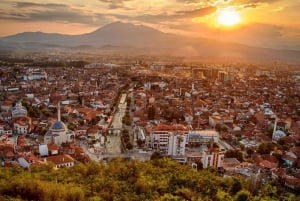Traditional Food in Bulgaria
Bulgarian food is in many ways similar to the food served in Greece and Turkey: tomato, cucumber and cheese salad (shopska salad), moussaka (musaka), filo pastries (byurek) and stuffed vine leaves (sarmi) are among the shared dishes. But there are important differences, too, and the use of sunflower instead of olive oil for cooking and flavouring is not the only one. Away from the Black Sea, there is less emphasis on fish dishes and a stronger reliance on vegetables and fruit. The meal often begins with a salad or a selection of traditional meze (appetizers). They are both usually accompanied by a glass of rakiya, the local brandy.



'Shopska' Salad Tarator Gyuvech
Many of the Bulgarian traditional dishes feature yoghurt, cheese, spices and herbs. Chubritsa is a herb similar to oregano and appears dried and crumbled onto soups, stews and even bread. Dill-scented tarator cold soup is wonderfully cooling on a hot summer day. Many dishes are meatless, such as the 'monastery-style' bean soup of white kidney beans and vegetables. It is believed that this dish has its origins in one of the country's religious orders. Bulgarians love stuffed vegetable dishes, peppers being a favourite. Usually baked, in summer peppers are filled with a mixture of cheese and eggs and deep-fried. Carp caught in the rivers of Bulgaria such as the Danube is the traditional dish served on the important feast day of St. Nicholas. At Christmas and New Year you will get to taste a delicious banitsa with lucky charms hidden among its filo leaves.

Traditional St.Nicholas Day Carp
FOOD IN THE MOUNTAINS
Geography plays the biggest role in the regional variations of Bulgarian cuisine. Livestock farming in the lower mountain ranges - most notably in the Rhodopes, Stara Planina, Strandzha, Rila and Pirin - is a tradition that goes back thousands of years. The omnipresent kiselo mlyako (yoghurt made of cows' milk) is usually eaten plain, but it also forms the base for tarator cold soup and the ayryan drink. Bulgarian cheese will be a familiar sight for most visitors, since it is very similar to the Greek feta cheese. However, it is inadvisable to compare them in front of a Bulgarian - unless you areto say that the Bulgarian version is better. Cheese turns up in a huge number of dishes, from filo pastry banitsa to shopska salad. The hard, yellow cheese called kashkaval is not as widely used, but it is an essential part of any meze. The famous Bulgarian sausages and cured meats are also key to any group of meze dishes. Spicy sausages such as sudzhuk, banski staretz and strandzhanski dyado, and the air-cured ham elenski but, seasoned with herbs, all stem from the need to preserve meat to last through the long and bitter mountain winters. Hearty stews are a mountain tradition too, with kavarma and pork ribs with kidney beans among the tastiest and most popular.

Shashlik
FOOD IN THE PLAINS
The best of Bulgaria's fruit and vegetables are grown in the plains south and north of Stara Planina. Berries, orchard fruits, melons and grapes (for the table as well as for wine) are among the many superb fruits. The Bulgarian peppers, tomatoes, cucumbers, onions, aubergines (eggplant), courgettes (zucchini) and potatoes are arguably the best in Europe and certainly among the cheapest. They feature prominently in a wide range of stews that go by the generic name of gyuvetch. Many salad dishes, such as shopska and ovcharska (shepherd's salad), originated in the plains and are at their very best here because of the freshness of the produce.
FOOD AT THE COAST
The dwindling fish stocks of the Black Sea are slowly on the mend and it is possible once more to enjoy excellent grilled bonito and stewed or fried scad when they arrive at the end of the summer. Sprats, served fried or marinated, are available throughout the year. Mussels are plentiful and good, but they must come from pollution-free sources. The Bulgarian fish soup, ribena chorba, is seasoned with thyme, and may be made with fresh or saltwater fish.














